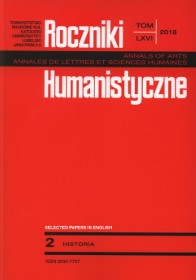The Symbolic Role of Poverty in the Franciscan Preaching of the Saxon Era
The Symbolic Role of Poverty in the Franciscan Preaching of the Saxon Era
Author(s): Filip WolańskiSubject(s): History, Modern Age, 16th Century, 17th Century, 18th Century
Published by: Towarzystwo Naukowe KUL & Katolicki Uniwersytet Lubelski Jana Pawła II
Keywords: preaching; poverty; charity; axiology; social communication; Franciscanism
Summary/Abstract: The Polish version of the article was published in Roczniki Humanistyczne vol. 61, issue 2 (2013). The article presents selected aspects of the functioning of the concept of poverty in the narrative of Old Polish Franciscan preaching of the Saxon era. The relationship between the context formed by Old Polish culture and the role of the idea of poverty in the Franciscan movement is presented. The author attempts to present the adaptation of the topica, drawing on the broadly conceived Christian tradition, to the realities of the Polish Republic. To do so, an analysis of the discourse of various types of sermons is presented. The object of the analysis is Sunday and holiday preaching. The article, though, focuses on funeral sermons, which apparently has great significance for the Sarmatian culture. The concluding section highlights the extreme importance of the issue of poverty as one of those cultural symbols that defined the place and meaning of caritas in Old Polish culture. It was also necessary to form various aspects of the social sensitivity of those times.
Journal: Roczniki Humanistyczne
- Issue Year: 66/2018
- Issue No: 2SP
- Page Range: 43-56
- Page Count: 14
- Language: English

